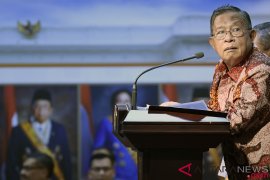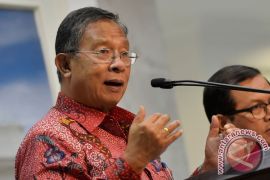"We are trying to boost economic activities through investment and government capital expenditure, hoping that the economy will move positively," Darmin said at an event held to publicize the governments economic policy package on Thursday.
He explained that the policy package was issued in three tranches after the government observed an economic slowdown as a result of the economic turmoil in the United States and China early in 2015.
The conditions had led to Indonesias export performance slowing down and capital outflow causing the exchange rate of the Rupiah against the U.S. dollar to continue weakening until the end of September.
"In the face of such a situation, exports of natural resources declined suddenly and there was an indication that the United States was willing to raise interest rates. These problems accumulated, with the economy slowing down and the unfavorable exchange rate of the Rupiah continuing to worsen over the past one year," Darmin explained.
Due to these reasons, the government had issued an economic policy package, aimed at maintaining the performance of investment, even as the economy is slowing down. The government has also expedited the realization of the budget expenditure so that it supports development optimally.
The minister acknowledged that there are too many regulations that need to be revised in the first economic policy package issued for the market in order to respond negatively to the governments efforts to improve the countrys economic performance.
"The first economic package was announced early in September. We admitted that it was too ambitious because it covered too many regulations. We also introduced the package to convince the market that we are serious. But the market read it differently," noted the Chief Economic Minister.
However, with the issuance of the second and third installments of the policy package having a short-term impact, they were more practical in responding to problems, such as those concerning investment licensing so that the markets response was more positive.
According to Darmin, besides the postponement of the U.S. Federal Reserves decision to raise interest rates, the positive response to the issuance of policy packages had caused the Rupiahs value to strengthen during the last several days.
"The Rupiah had weakened because we failed to convince the market. So, we are trying to improve this. The currencies of other countries have also strengthened against the greenback, but currencies which were quick to strengthen also belonged to states, which had adopted the most convincing economic improvement measures. This is what we are trying to do," Darmin stated.
Earlier on Wednesday, October 7, the government had announced the third tranche of its economic policy package, which among others covered cuts in the prices of fuel oils, electricity tariff and gas, expansion in the number of micro loan (KUR) credit recipients, and streamlined land business permit procedures for capital investment.
This policy package is a follow up of the first and second phase of a series of economic policy packages announced in September, which among others covered deregulation. It aims to improve the investment climate and accelerate development projects.
The guideline of the issuance of the economic policy package is to expedite the conducive development of a macro economy, boost the national economy, protect low-income people and improve the development of the village economy.
The series of packages have been issued by the government to overcome the ongoing economic slowdown, which is a result of an uncertain global economy, and reinforce the Indonesian economic structure and competitiveness, the minister added.(*)
Editor: Heru Purwanto
Copyright © ANTARA 2015



